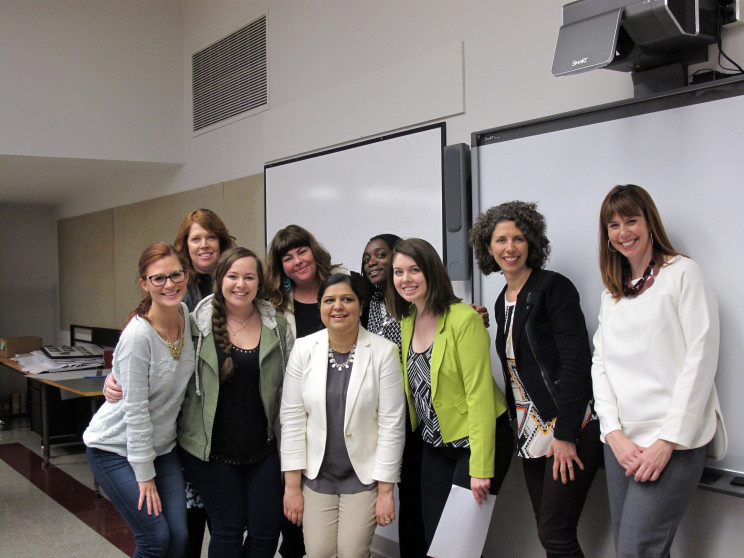Haworth guest critic Lindsey Rain (Interior Design ‘92) gave Tina Patel and Professor Abimbola Asojo’s Interior Design studios a very contemporary challenge: design a flexible work café that can accommodate a range of work styles and functions.

The assignment was an preview of the type of commercial projects interior students can expect to tackle after graduation. As Rain explained, “more and more we are seeing corporate clients leaning towards an alternative workplace strategy. Workers are more engaged when they have spaces that make them feel good and offer all of the ‘tools’ they need to do work. Engaged employees mean more productive employees.”
“Third places” are also popular among start-ups and companies who employ freelancers. “These newer fresh spaces offer areas to connect to power, grab a cup of coffee and give workers a variety of spaces to reflect, concentrate or collaborate,” Rain added. To meet all these needs, she asked the students to incorporate spaces for a front desk, lounge seating for visitors, a conference room able to seat up to 25, spots for quiet individual work, open office space, and an employee lounge and kitchenette.
A team of guest critics—including Haworth designers and Betsy Vohs, principal of Studio BV—selected Lexi Sosalla’s design for first place, with additional honors (and prizes) to Morgan Altman, Hunter Millar, and Kailin Hurinenko. Rain enjoys critiquing and working with students. “My favorite part is seeing the enthusiasm in the design students and their fresh perspectives. I surprised by their rendering abilities! They are so much more advanced than when I was a student in design school 25 years ago,” she noted.
This fall, interior design juniors in Professor Abimbola Asojo’s IDES 3612 Lighting Design class were given the chance to shine in the Groovystuff Ambient Lighting Challenge.
When designing for today’s workplace, interior designers are increasingly called upon to think beyond the traditional cubicle and create a more contemporary space. Interior design students in Abimbola Asojo and Justine Pliska’s IDES 2604 experienced this first-hand when they were asked to design a “third place work cafe” as part of a competition from Haworth.
Universal design is the practice of designing an environment in such a way that it is accessible and usable by the greatest number of people possible, no matter their age, cultural background, or ability.





